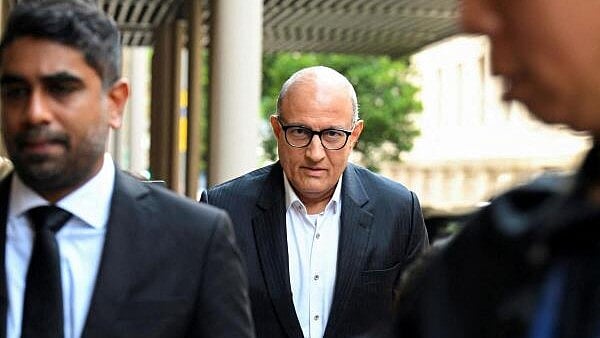
Singapore's former transport minister S. Iswaran arrives at the Supreme Court in Singapore.
Credit: Reuters Photo
By Karishma Vaswani
Singapore’s ruling People’s Action Party has built its reputation on honesty and integrity, while delivering superior economic progress to its citizens. Those credentials are at stake as the party grapples with the latest scandal in its ranks: The case of former transport minister S Iswaran. On Tuesday, he pleaded guilty to five charges, four for obtaining valuable items as a public servant and one for obstructing the course of justice. Newly appointed Prime Minister Lawrence Wong has a chance to renew trust with voters, and refresh the social contract between the government and the people.
Iswaran was meant to face a lengthy trial, but his last-minute about-face has dominated conversations in coffee shops and social media forums across the island. He was charged in January for allegedly taking expensive gifts from two businessmen — property tycoon Ong Beng Seng, who owns the rights to the Singapore Grand Prix and played a key role in bringing the Formula One race to the city-state, and construction boss Lum Kok Seng.
When the charges were first filed, Iswaran insisted he was innocent and vowed to contest them. On Tuesday, the prosecution amended the accusations and dropped the corruption crimes. Iswaran subsequently pled guilty to a smaller set of five indictments. He is on bail and due to be sentenced on Oct. 3. Such is the public interest in the case that people were queuing for tickets to watch the proceedings.
This is almost certainly the end of Iswaran’s political career, and the latest stain on the PAP’s once spotless record.
In June last year, two senior cadres were cleared of wrongdoing by the anti-corruption bureau for their rental of colonial-era houses in an upscale neighborhood, after the opposition alleged they paid below-market rates. A month later, two parliamentarians who had an extramarital affair resigned, after the former premier Lee Hsien Loong intervened to break them up — twice.
The government could do without the distraction. Elections must be held before November 2025, and the focus is on reminding Singaporeans about the challenges ahead, and which party is best placed to guide the nation through them.
Earlier this week, a headline in the Straits Times declared, “More Singaporean deaths than births possible by first half of 2030s,” warning that the population would shrink without immigration. Then the government released figures that showed the population is now above 6 million people — a record — with the biggest growth among non-residents.
Credit: Bloomberg
Immigration and the cost-of-living are key concerns for voters. The PAP had one of its worst-ever showings in 2020 — despite winning 61 per cent of the popular vote — due in part to concerns about the economy.
It’s a tricky balancing act for Wong, who just this week has been warning of the “dark clouds over the horizon” regarding the US-China contest for dominance in the Asia-Pacific. He’s leading a team of ministers who are vastly different from the ones who built the nation, bringing it, in the words of the late founding father, Lee Kuan Yew, from Third World to First. The current crop, or the 4G, as they are known, are viewed by a segment of Singaporeans as arrogant and out-of-touch. The fact that they earn million-dollar salaries, more than 10 times the average Singaporean’s wages, is also a sore point.
The government implemented private-sector standard salaries in 1994 to attract the best talent and prevent a culture of graft. But times have changed, Chong Ja Ian, an associate professor of political science at the National University of Singapore, notes. “These rules were established at a time when the PAP could legitimately say if we pay our ministers the highest salaries, they will be corruption free. With the wealth that is available in Singapore today, is this approach still feasible? Whether the PAP can come up with some alternative mechanisms remains untested.”
As the new leader, Wong has already clocked that there is an image problem, saying when Iswaran was first charged in January that maintaining clean government is non-negotiable. “This is part of our DNA,” he added. “There can be no compromise, no relaxation, no fudging of this, no matter the political price.”
There are things Wong can do to remind voters of the party’s principled history, and hark back to the can-do philosophy that helped build Singapore’s success. He has an opportunity for radical transparency, and could impose sweeping changes. One option is to mandate that MPs, elected officials and their families publicly disclose their assets. Currently, Singaporean political office holders only have to declare their income and assets to the prime minister. Wong could also argue that a parliamentarian or civil servant should not hold another job or directorship in the private sector, as some currently do.
The prime minister addressed this in a dialogue with students in July, saying the government recognized some MPs have “other private sector commitments” and that they were allowed to have full-time jobs, but that they were also fully expected to discharge their MP duties.
Divorcing public service from private sector pay could go a long way toward weeding out those not fully committed to their electorates. In the past, it was thought that if you want to attract the best talent to the ranks of Singapore’s elite, you need to pay them handsomely. But perhaps the new philosophy should be: If you don’t want to make some sacrifices to serve the people, then perhaps you’re not cut out for politics.